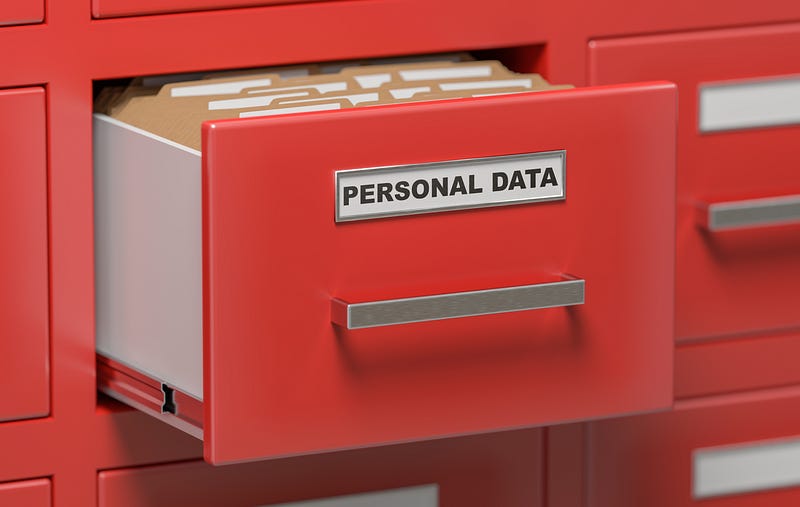 “Data Slavery.” Jennifer Lyn Morone, an American artist, thinks this is the state in which most people now live. To get free online services, she laments, they hand over intimate information to technology firms. “Personal data are much more valuable than you think,” she says. To highlight this sorry state of affairs, Ms Morone has resorted to what she calls “extreme capitalism”: she registered herself as a company in Delaware in an effort to exploit her personal data for financial gain. She created dossiers containing different subsets of data, which she displayed in a London gallery in 2016 and offered for sale, starting at £100 ($135). The entire collection, including her health data and social-security number, can be had for £7,000.
“Data Slavery.” Jennifer Lyn Morone, an American artist, thinks this is the state in which most people now live. To get free online services, she laments, they hand over intimate information to technology firms. “Personal data are much more valuable than you think,” she says. To highlight this sorry state of affairs, Ms Morone has resorted to what she calls “extreme capitalism”: she registered herself as a company in Delaware in an effort to exploit her personal data for financial gain. She created dossiers containing different subsets of data, which she displayed in a London gallery in 2016 and offered for sale, starting at £100 ($135). The entire collection, including her health data and social-security number, can be had for £7,000.
Only a few buyers have taken her up on this offer and she finds “the whole thing really absurd”. Yet if the job of the artist is to anticipate the Zeitgeist, Ms Morone was dead on: this year the world has discovered that something is rotten in the data economy. Since it emerged in March that Cambridge Analytica, a political consultancy, had acquired data on 87m Facebook users in underhand ways, voices calling for a rethink of the handling of online personal data have only grown louder. Even Angela Merkel, Germany’s chancellor, recently called for a price to be put on personal data, asking researchers to come up with solutions.
Data provided by humans can be seen as a form of labour which powers artificial intelligence
Given the current state of digital affairs, in which the collection and exploitation of personal data is dominated by big tech firms, Ms Morone’s approach, in which individuals offer their data for sale, seems unlikely to catch on. But what if people really controlled their data — and the tech giants were required to pay for access? What would such a data economy look like?
It would not be the first time that an important economic resource had gone from simply being used to being owned and traded; the same has already happened with land and water, for example. But digital information seems an unlikely candidate to be allocated by markets. Unlike physical resources, personal data are an example of what economists call “non-rival” goods, meaning they can be used more than once. In fact, the more they are used, the better for society. And frequent leaks show how difficult it can be to control data. But another historical precedent might provide a model — and also chimes with contemporary concerns about “technofeudalism”, argue Jaron Lanier, a virtual-reality pioneer, and Glen Weyl, an economist at Yale University, who both work for Microsoft Research.
Labour, like data, is a resource that is hard to pin down. Workers were not properly compensated for labour for most of human history. Even once people were free to sell their labour, it took decades for wages to reach liveable levels on average. History won’t repeat itself, but chances are that it will rhyme, Mr Weyl predicts in “Radical Markets”, a provocative new book he has co-written with Eric Posner of the University of Chicago. He argues that in the age of artificial intelligence, it makes sense to treat data as a form of labour.
To understand why, it helps to keep in mind that “artificial intelligence” is something of a misnomer. Messrs Weyl and Posner call it “collective intelligence”: most AI algorithms need to be trained using reams of human-generated examples, in a process called machine learning. Unless they know what the right answers (provided by humans) are meant to be, algorithms cannot translate languages, understand speech or recognise objects in images. Data provided by humans can thus be seen as a form of labour which powers AI. As the data economy grows up, such data work will take many forms. Much of it will be passive, as people engage in all kinds of activities — liking social-media posts, listening to music, recommending restaurants — that generate the data needed to power new services. But some people’s data work will be more active, as they make decisions (such as labelling images or steering a car through a busy city) that can be used as the basis for training AI systems.
Yet whether such data are generated actively or passively, few people will have the time or inclination to keep track of all the information they generate, or estimate its value. Even those who do will lack the bargaining power to get a good deal from AI firms. But the history of labour offers a hint about how things could evolve: because historically, if wages rose to acceptable levels, it was mostly due to unions. Similarly, Mr Weyl expects to see the rise of what he calls “data-labour unions”, organisations that serve as gatekeepers of people’s data. Like their predecessors, they will negotiate rates, monitor members’ data work and ensure the quality of their digital output, for instance by keeping reputation scores. Unions could funnel specialist data work to their members and even organise strikes, for instance by blocking access to exert influence on a company employing its members’ data. Similarly, data unions could be conduits channelling members’ data contributions, all while tracking them and billing AI firms that benefit from them.
No comments:
Post a Comment